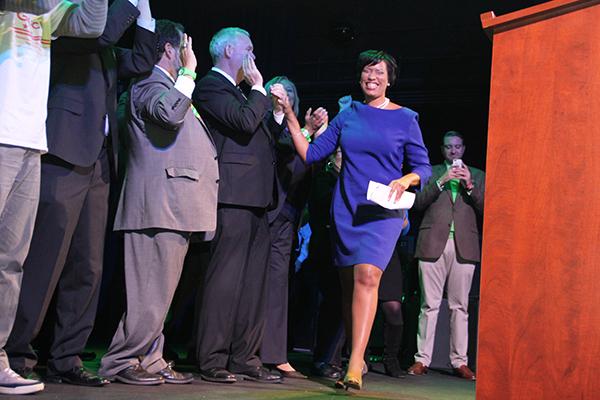When Muriel Bowser becomes D.C.’s second-ever female mayor, the city will also become one of the few across the nation to be led by a woman.
Bowser, elected on Tuesday with overwhelming support, will be D.C.’s first female mayor in two decades. That’s an uncommon position, and she is aiming to expand equality for women and minorities across the city during her tenure.
Only three other major cities – Baltimore, Houston and Minneapolis – have female mayors. During her victory speech late Tuesday night, Bowser said she will remain dedicated to women’s rights in D.C.
“We believe in a level playing field for women and minorities … We know we are Washington, D.C. and we must do better,” she said.
During her campaign, Bowser prioritized expanding affordable housing to prevent “moms, dads and kids” from ending up in homeless shelters. Nationwide, homelessness particularly affects women and children. From 2009 to 2010, homelessness among women and girls increased about 14 percent, according to Thrive D.C., a homelessness prevention program.
D.C.’s only other female mayor in its history, Sharon Pratt, led the city from 1991 to 1995 and was also the first black woman to become mayor of a major U.S. city.
Bowser, a D.C. Council member since 2007, won about 55 percent of the vote, and also beat out another woman, Independent Carol Schwartz, and another Independent opponent, David Catania.
Joaquin McPeek, a spokeswoman for the Bowser campaign, said Bowser’s election proves that D.C. voters care about women and working families.
“She cares so much and will make a priority of lots of the issues most important to women,” McPeek said.
Women are paid 91 percent of what men are paid in D.C., making it one of the best cities for equal pay, according to a report from the American Association of University Women.
Kathy Patterson, a former Council member who spent more than a decade representing Ward 3, said electing women to office helps shift a government’s focus to issues that closely affect women, like homelessness and early childhood education.
“Women bring their own experiences and perspectives,” she said, adding that the city “passed a graduated driver’s license law and made the District smoke-free” because the bills were related to women’s health.
Stephanie Maltz, a member of the Dupont Circle Advisory Neighborhood Commission, said it is “really great” that a woman has become mayor of D.C. for a second time because it helps dispel stereotypes about women who enter politics.
Maltz, who worked as an organizer during the campaign, said she felt a personal connection to Bowser when they had a long conversation at a campaign event during the primaries.
When Maltz joined the ANC, she was one of only three women to serve on the commission. She said it’s important for young girls to have women to look up to in city politics, which helps them visualize one day also becoming leaders.
“It’s important to see that wide range of things they can do and the opportunities available,” Maltz said. “It’s nice to see we’re breaking that barrier time and time again.”
Four women serve on the D.C. Council, including Anita Bonds, an At-Large Council member, and Mary Cheh, who represents Ward 3 and is also a GW Law School professor.
Bowser, who was born in D.C. and is black, also follows a line of black mayors who have run the city since home rule began in 1974. Those local roots have helped her connect with residents across the city.
Bowser won 66 percent of the vote in precincts that had majority African-American populations, WAMU reported. About half of D.C.’s population is African-American.
She also brought in most of her votes in majority-black areas, like Southeast D.C., which demonstrates a strong connection to D.C.’s black community, said Matthew Green, a political science professor at the Catholic University of America.
But he said Bowser could face challenges trying to bridge the gap between poor, minority groups and wealthier residents in areas like Georgetown.
“She’s the mayor of the city. Regardless of who voted for her, she represents the entire city,” he said. “The problem she might have is actually being able to help those in greatest need in the city while at the same time assuring others that she’s not ignoring their interests as well.”







